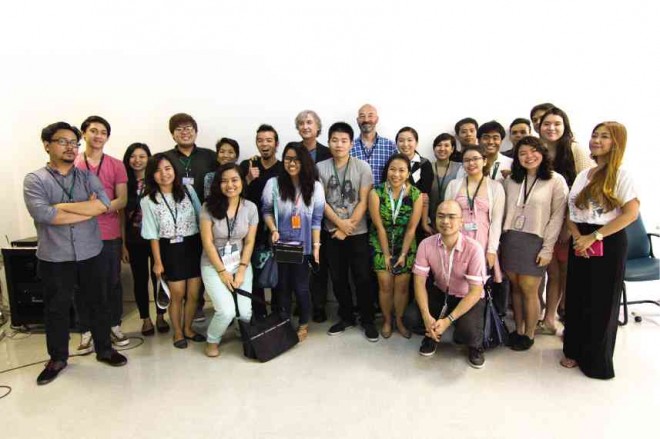Editorial cartoons as medium for understanding social issues

CARTOONISTS Abrera, Plantu, Katzenelson and Cham with the participants of the DLSU master class Nelissa Chua/Contributor
The international group Cartooning for Peace held recently a master class and a workshop at De La Salle University (DLSU).
Cartoonists Plantu, Bob Katzenelson, Inquirer’s Manix Abrera and freelancer Rob Cham conducted the class.
Plantu, who does mostly political satire for the French newspaper Le Monde, said editorial cartoons could transcend language barriers and could be an instrument for peace.
“If we’re not able to speak with one another or recognize the opinions of others, we can use cartoons,” he said.
Katzenelson, who focuses mostly on social issues in European countries, works as illustrator, cartoonist and caricaturist in various Danish newspapers and magazines.
Article continues after this advertisement“Nowadays pictures, images, illustrations and photographs are everywhere. We can’t get a story without images. This is our life today. We, as cartoonists, are a part of that world,” Katzenelson said.
Article continues after this advertisementImages in the media, he said, had become a big part of the understanding of social issues. Unlike before where words were mostly used, he said images like editorial cartoons now had a role in shaping the views of the readers.
Abrera talked about his editorial cartoons that tackled local issues like poverty, poor quality of education and unemployment. He said the issue closest to his heart was education, which is vital to nation building.
“One of the powers of an editorial cartoon is to bring across a social issue to the readers,” Abrera said in Filipino. “It’s also important to create a story and make your editorial cartoons funny. Once readers find it funny, it’s easier for them to recognize the issue being tackled.”
Apart from his work as a cartoonist, Abrera is also known for the daily comic strip “Kiko Machine,” which is published in the Inquirer. He began cartooning while serving as graphics editor of the Philippine Collegian from 2001 to 2003.
Cham discussed what it was like to be a young cartoonist on the Internet. He is an active user of various social networking sites, where he usually uploads his work.
“I’ve always used the Internet as a tool to get my work out there. The most important thing for me in cartoons is to get the message across,” he said.
Cham is currently an illustrator, comic artist and designer.
Although he has yet to tackle more serious social issues, he said he was interested in the “hypocrisy and bigotry” in the country.
Students presented their editorial cartoons, which dealt with issues like the Association of Southeast Asian Nations (Asean) integration, the dispute over the Spratly Islands, the Mamasapano clash, and the increase in the number of overseas Filipino workers. They received comments from the professionals.
The open forum that followed the master class was attended by DLSU students, administrators and various student organizations such as The LaSallian, Ang Pahayagang Plaridel, European Studies Association, and Organization for American Studies.
The participants were asked if freedom of speech was under threat in the Philippines because of religious and traditional beliefs. While Abrera and Cham said Philippine media were still not free from censorship, they said they were stronger now because of the Internet.
“If it’s scary here and dangerous for journalists, what more for cartoonists?” Cham said.
When the tables were turned, the cartoonists were asked how they handled criticism. They replied that criticism was a natural part of their job and could even help them improve their craft.
The writer is a third year AB Psychology and BS Business Management student at De La Salle University Manila.